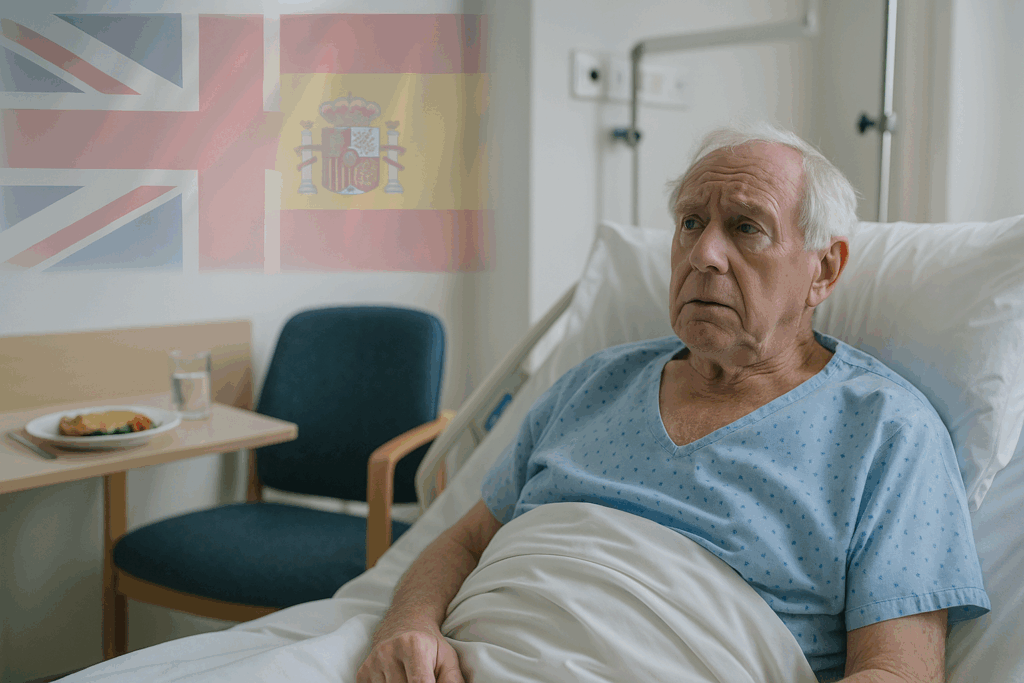 Repatriation
Repatriation
Understanding Hospital Care in Spain vs NHS in the UK: Insights for British Families Abroad
Navigating Hospital Care in Spain vs the UK: Guidance for British Families
Hospital care in Spain for British expats is often very different from what families expect compared to the NHS. While Spain offers excellent emergency treatment, ongoing hospital support can be limited, especially for older patients or those without relatives nearby. Understanding the differences is key to protecting your loved one’s health and dignity abroad.
Hospital experiences in Spain can be surprising for British families used to the NHS. With over 400,000 UK citizens living in Spain, many retirees find themselves unprepared for a hospital stay abroad. While emergency treatment in Spain is often excellent, the ongoing care model is very different from what most UK nationals expect.
This guide draws on over 10 years of first-hand experience supporting British patients in Spain. It highlights the practical and cultural differences between Spanish hospitals and NHS care — and offers real-world advice to families making difficult decisions, including when medical repatriation to the UK may be needed.
How Hospital Support in Spain Differs from the NHS
One of the biggest differences British families encounter is around personal care. In the UK, nurses and healthcare assistants help with washing, feeding, toileting, and mobility. In Spain, these non-clinical needs are usually the family’s responsibility.
Spanish hospital staff deliver medical treatment, but expect relatives to assist with daily support. If no family is present, patients may miss meals or go without help for essential tasks. This system often shocks NHS users, who assume hospital care includes round-the-clock personal assistance.
What Happens When Patients Are Alone
We’ve seen British patients struggle when left unsupported in Spanish hospitals. Simple things — like meals left untouched, water jugs out of reach, or no help changing clothes — can lead to decline. Those who can’t reposition themselves are also at high risk of pressure sores if not regularly moved.
Without advocacy or basic support, even stable patients can deteriorate quickly. We’ve supported families where loved ones were restrained unnecessarily or left unattended due to staff assumptions about family presence.
“We arrived to find my dad strapped to the bed. He hadn’t eaten properly in two days. The nurses were kind, but they just didn’t have the time—and no one told us we needed to be there round the clock. It was heartbreaking.”
– Daughter of a British patient, Costa Blanca
Understanding the Spanish Discharge Process
Unlike the NHS, Spanish hospitals often discharge patients soon after their condition is medically stable. There’s little emphasis on arranging follow-up care or rehab unless families take initiative. Even patients who are still incontinent or unable to stand may be sent home with minimal support.
This places a heavy burden on families, who may have to source private carers or arrange medical repatriation without warning.
Why Strong Emergency Care Can Be Misleading
Spain is known for responsive emergency departments — strokes, heart attacks, and trauma are treated quickly and effectively. But after emergency care, patients move to general wards where assumptions change. Feeding, moving, and hygiene often fall to family members.
British expats may initially feel reassured, then realise they must step in to meet daily needs. Without this awareness, avoidable complications may occur.
Why Care Standards Vary Across Spain
Healthcare in Spain is managed by each of its 17 regions. Larger cities like Madrid and Barcelona often have better resources, more staff, and greater experience with foreign patients. In rural or coastal areas, support can be much more limited.
Always ask what support is included and whether additional help is needed — especially if you’re not nearby.
Insights from Years of Supporting British Families
At BM Ambulance, we’ve worked alongside our partners for over a decade, helping British families repatriate loved ones from Spain. We understand the gaps in hospital care — especially for elderly or vulnerable patients who don’t have relatives nearby. That experience means we can act quickly when safe return to the UK becomes necessary.
Practical Tips for Families
- While in ICU: Stay in contact with doctors, take notes, and begin early discussions if repatriation might be needed.
- On a general ward: Visit regularly or hire local care. Do not assume meals, hygiene, or supervision are covered.
- Look out for signs: Missed meals, confusion, and poor hygiene can signal deeper issues. Nutritional drinks, regular fluids, and personal contact can help.
- Stay informed: Language can be a barrier. Use interpreters if needed, and maintain daily check-ins with staff and your repatriation provider.
The Importance of Acting Early
Delaying repatriation can worsen outcomes. Older patients lose muscle rapidly and face higher infection risks with prolonged hospital stays. If travel is needed, it’s often better to act sooner than later.
Our medical team can administer medication during road or air repatriation, so there’s no need to wait for antibiotics to finish before making arrangements.
Final Thoughts
Spanish hospitals are excellent at acute care — but personal support is usually left to families. For British expats, understanding this can prevent distress and support better outcomes. Whether you stay nearby, hire help, or consider medical repatriation, being informed and involved is crucial.
BM Ambulance offers fast, clinically managed solutions to help bring loved ones home safely. Our team is available 24/7 to support British families through difficult hospital situations abroad.
Worried About a Loved One in a Spanish Hospital?
Our medical team is here 24/7 to guide you through your options and help plan a safe return home.
 BM
BM 